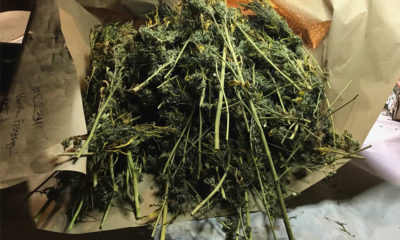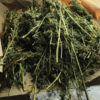
Culture
The Emerald Cup Harvest Ball Becomes Epic Event in 2022
The event’s founder and cannabis culture stalwart, Tim Blake, shares his thoughts on the past and the future.
For nearly two decades, the Emerald Cup (EC) has honored the very best of Californian sungrown cannabis. The festival underpins the heritage of small-batch craft cultivators in Northern California, infusing it with the best of music, art and cannabis. The community-focused celebration has evolved from the first event in 2004, held at Area 101 in Laytonville, into a prestigious cannabis awards show and product exposition in Sonoma and, most recently, Los Angeles.
Founder Tim Blake, a self-described “old-school outlaw,” has become recognized as a custodian of cannabis culture. His support of small farmers in their time of need is unwavering; his recognition of the need to integrate with the biggest current cannabis players such as Cookies is visionary. And the fact that he’s doing all this while encouraging and engaging in progressive conversation with government departments is a testament to his passion for the plant and his relentless drive for education and innovation.
In the lead-up to this year’s Emerald Cup Harvest Ball, which takes placed Dec. 10-11 at the Sonoma County Fairgrounds in Santa Rosa, California, Blake spoke to Cannabis Now about the cup’s evolution, lessons learned from previous years and what we can expect from the action-packed event.

The Emerald Cup Awards
One of the Emerald Cup’s core pillars is to recognize advocates who campaign tirelessly for cannabis. Previous winners from the community include SweetLeaf Joe, Eric McCauley and Pebbles Trippet. One of Blake’s fondest memories of the cup was in 2013 when Dennis Peron, the father of medical cannabis and legendary activist, agreed to accept his Lifetime Achievement Award on one condition—that he could also be married on the stage. Blake remembers it as “the most incredible moment.”
“They called up and said, ‘We’re gonna take your award, but we’d like to do a marriage ceremony on the stage,’” Blake said. “I thought, ‘We’re gonna do a gay marriage ceremony on the stage at the Emerald Cup because if Dennis asked, we’re doing it.’ And then we went ahead and did it. What an incredible part of history to say we were part of.”
Blake recalls when he first heard “prominent people such as Cheech” were coming into the industry. When Willie Nelson was nominated, he wanted the award’s title changed to the Willie Nelson Award, which, Blake says, “made it much easier to get higher-profile people.” The 2022 recipient, Woody Harrelson, is well-known for his Hollywood hits and cannabis and hemp advocacy.
For this year’s awards ceremony, Blake and his team brought the spirit of the Emerald Triangle down to Los Angeles on May 14. The event coincided with the opening of Harrelson’s new West Hollywood-based dispensary, The Woods, and they appeared together on the front page of LA Weekly. Blake’s voice reveals all the love and admiration he has for Harrelson as he discusses the energy and support the actor has shown sungrown farmers.
“The invitation to the dispensary read, ‘Woody Harrelson, Tim Blake and the Emerald Cup invite you to the opening of The Woods,’ and I was like, ‘Oh, my God, what an incredible thing for him to do’,” Blake says.
“He started by telling us that we could only bring 100 people and we were thinking, ‘Who can we invite?’ We had all of our contestants and all of our sponsors. And then it pushed out from 100 to 200 people. On opening night, we overran the place. Woody had to pull back to the lounge with all the stars. He left our party early and I thought we’d done something wrong, but it turned out Paul McCartney had called him up and wanted to party with him.”
The following day, Blake says, the NorCal farmers met on the corner of legendary Los Angeles intersection Hollywood and Vine for a press photo-op before “walking en masse to the Montalbán Theater and taking a picture with Pebbles Trippet in the middle of them. That was a wonderful moment, and our small farmers realized that they, too, belonged in LA.”
After that, at the awards ceremony, Harrelson was up on the stage to receive the award, and according to Blake, “He looked over at us and said, ‘You had more friends than I did at the opening last night!’
“He was up on that stage doing stand-up for 20 minutes; he made joke, after joke, after joke,” Blake recounts. “It was just amazing. [Woody] said, ‘You know, these are my people. This is my community.’ Because he felt it. He’s protested before, he’s humble, he knows the scene. It was really touching. I love Woody forever for that. I can’t thank him enough for doing what he did.”
More love for Woody was in order.
“I’m really proud that Woody looked into who we are and realized the Emerald Cup is an integrity-based, community-oriented show for the people, for small farmers, for sungrown cannabis—everything we are fits with him,” Blake says. “He’s evangelizing for small farmers; he’s putting his name on the line. He’s the real deal.”

Small Farms Initiative
At its core, the Emerald Cup celebrates the best sungrown, heritage, small-batch craft flower and its farmers. Sadly, since 2016, a brutal combination of taxation, licensing and market conditions has led Northern California’s cannabis community to an existential crisis. To show their support for the farmer’s plight, Blake, along with Michael Katz of the Mendocino Cannabis Alliance; Genine Coleman of Origins Council; Chris Anderson of Redwood Roots Distribution; Nicholas Smilgys of Mendocino Cannabis Distribution; Traci Pellar of the Mendocino Producers Guild; and Brandy Moulton of Sovereign 707, created the Small Farms Initiative, which debuted at last year’s event.
“Last year, we ran a lottery system and gave away 23 booths and told people they could share them,” Blake says. “Next thing you know, we had 50 farmers in there, all for free. It was a tremendous success and really highlighted the plight of the small farmers.”
The Harvest Ball is ramping up its support initiatives this year with sponsorship support from Harborside and Urbn Leaf. 200 farmers have been invited to the Harvest Ball to get their products directly in front of buyers in a direct sales “speed selling” environment. Eight booths have also been given to social equity brands from the Bay Area along with the small farmers. A “speed meeting” industry opportunity has also been arranged for small, craft and heirloom farmers to present their very best products to buyers and merchandisers, Blake explains. The Emerald Cup Buyers Club Meet & Greet is scheduled on December 9 at the flagship Mercy Wellness’ new consumption lounge space.
The inability to offer direct-to-consumer sales significantly impacts local farmers’ income options. Blake compares it to the early days of alcohol prohibition and how it took more than half a century before breweries and vineyards could sell direct to consumers at their cellar doors. It’s about giving farmers a chance to survive, he says.
“It’s a big topic of conversation at this year’s Harvest Ball; we have panels on what we need to do to save these small farmers,” Blake says. “One of the main issues is direct sales.”
Blake acknowledges the historical animosity of the Emerald Triangle farmers who were devastated by the big groups that advocated for taking that cap off the small acreage as outlined in Prop 64, the 2016 initiative that legalized adult-use cannabis in California.
“The bill was specifically written to prohibit anyone from growing more than one acre of cannabis for five years,” he says. “This was done with the knowledge that if large-scale farming was immediately allowed, the small legacy farmers wouldn’t have time to get established or deal with the rapid price decreases that were inevitable. Two months into legalization, Governor Gavin Newsom went back on his promise and allowed large-scale farming, with support and advocacy from larger stakeholders. It created an extinction event for those legacy farmers in the Emerald Triangle and throughout the rest of the state. There’s a lot of anger and bitterness and resentment, which we have to deal with.”
However, he knows there has to be unity and that by coming together, they can make it work.
“We’re doing everything we can to give back to the farmers,” Blake says. “That’s what we’ve always been about.”

Working With The DCC
The Department of Cannabis Control caught some heat for its “heavy-handed” actions toward attendees and exhibitors at last year’s Harvest Ball. In true Blake style, instead of “calling them out” as he was encouraged, he chose the path of restoration and unity. Over the past six months, Blake, his team and the DCC have formulated a plan to allow vendor sampling in the Craft Cannabis Marketplace.
“We sat down with them and said, ‘Look, if you want to end events and you don’t want anybody to do events, then continue like this because nobody’s going to feel comfortable coming to the events,’” Blake said.
This year, the DCC will have a discreet booth at the show so they can “interact with farmers and talk to people and brands.” A panel titled “A Conversation With The DCC: How We Can Work Together To Make Positive Change” is also scheduled for Sunday, December 11, from 12-12:45 pm as part of the EC session in the garden annex.
“We need to work with the governor; we need to work with the DCC; we need to work with corporations,” Blake says. “Everybody must come together, get around the table, and work it out.”
And, according to Blake, it’s not just for the Emerald Cup, but for every event moving forward.
“Whether it’s a farmer’s market or somebody else’s event, we’re doing the work so that these can go about reasonably so everybody can have a good time,” he says.
If you’re attending this year’s Harvest Ball, be sure to download the new app to learn more about the DCC’s panel. The app also allows you to create your own schedules for the two-day event, so you won’t miss any discussion panels or your favorite artists performing live on stage. The app will also let you curate your favorites list as you navigate your way booth-by-booth through the Craft Cannabis Marketplace—an absolute must to secure the world’s most highly sought-after seeds and clones, as well as the newest cannabis products.
The New Cannabis Classification System
One factor that makes the Emerald Cup so crucial to California’s cannabis market is its continued strive for excellence and education. For the 2022 awards, Blake and his team modified the judging process to reflect the advances of cultivars and chemovars. According to Blake, Alec Dixon, one of the co-founders of SC Labs, was the driving force behind the creation of the Emerald Cup Cannabis Classification System powered by SC Labs and PhytoFacts.
“Over the years, Alec started telling me, ‘Tim, we got to break up the way the judging gets done because it can’t be done this way,'” Blake said. “Mark Lewis had been working on this system for quite some time, and so it’s kind of a merger of us coming together. We’re trying to reframe the industry.”
One of the bonuses, Blake says, is that it allows for “all these different terpene profiles a chance to be recognized.” The new cannabis classification system separates and judges entries based on terpenes, flavor and effects. For Blake, it’s an excellent opportunity to educate the public about the nuances between different cultivars, encouraging them to learn about terpenes profiles instead of just going to the strain with the highest THC level. That factor alone has never won the cup.
“That’s not what we’re looking for,” Blake says. “It’s got to be something unique. It’s a wonderful learning and educational experience. It’s a wonderful process to recognize all the different varieties and cultivars and let them win. And it’s just been such a wonderful process to teach people about.”

The Emerald Cup Today
The Emerald Cup has undergone quite a transformation and is barely recognizable from the inaugural 2004 event that was “completely illegal,” according to its founder. Back then, it was purely a flower contest, with a handful of Emerald Triangle friends and farmers coming down from the mountains to show off their choice picks from that year’s harvest, with many hiding their identities to avoid prosecution.
Without Blake’s knowledge, hash debuted in the cup the following year, in 2005. Back then, hash could land you in jail for up to five years; this was still the Wild West of weed and extracts hadn’t yet entered the fray. In the following years, the cup opened up to seed sales, tinctures and other categories as the market and product offerings continued to increase.
Blake recalls the introduction of concentrates that “come from nowhere; there wasn’t even the word concentrate” that changed the cannabis landscape. He fondly remembers when Frenchy Cannoli, the revered hashish evangelist judged the awards one year and said, “‘That isn’t hashish.” And we said, ‘No Frenchy, it’s concentrates.’ That was a whole learning curve for him, for me, for everybody.”
The cup had no vendors or sponsors in those early days. The first to get onboard was SC Labs, one of the industry’s original testing labs. “People wondered what the heck they were doing there,” Blake says. “The first year the cup tested concentrates, there was a 75% fail. Within two years, we had that down below 5% because people realized they couldn’t get away with that anymore. It was really good that the testing cleaned it all up.”
Today, the cup has more than 40 categories, almost 50 with the inclusion of the awards—a fact that Blake calls “mind-boggling.”
“There have been so many industry changes over the last 20 years, so many different issues that have been dealt with as we’ve gone along the path, it’s really been something to see,” Blake says. “To watch that evolution has been an incredible thing.”
Blake’s daughter Taylor started helping her dad at the Emerald Cup in 2006 and about eight years ago, she started doing it full-time. “Everybody loves her so much and that she’s side by side with me,” Blake beams as he talks about his youngest child. The proud father says that Taylor plans to continue the family business.
“She can handle any part of the show,” he says. “I’m so proud that she stands with me and we do the cup together. And as I get older and retire, she’ll take the reins—the show’s in good hands.”

The Future of Cannabis
Blake believes that the federal legalization of cannabis will take place over the next couple of years and when it happens, the plant has a bright future—not just in California but worldwide.
“Cannabis was a key aspect in just about every society in the world until it was demonized in the 1900s,” Blake says. “Most countries will soon legalize cannabis as well and we’ll see it in their people’s daily lives in one form or another, creating healthier, more vibrant cultures.”
And even though the farmers are having a very rough time, Blake focuses on the positive angle in the way only he can.
“Watching cannabis go legal across the country so quickly, and across the world and then following that, the plant medicines and all the psychedelic medicines, it’s like, OK, we don’t have people going to jail. We have mainstream media or people embracing this; we got plant medicine coming in,” he says. “And so the good that it’s done has to outweigh people’s personal needs. Because, at the end of the day, it’s about society and what we need to do for our world to heal it. And with cannabis and plant medicines, we’re healing the world.”
























